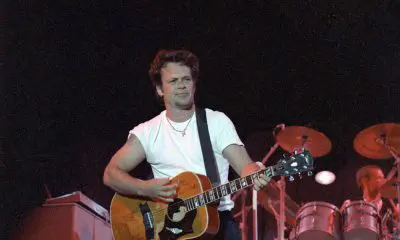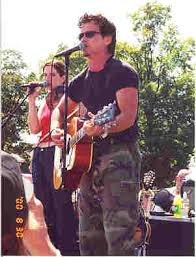The Good Samaritan Tour:"Everybody has to be a better person"
- eclectic Stefan

- Sep 13, 2021
- 7 min read
Updated: May 14, 2024


The Good Samaritan Tour 2000 is a documentary about musical performances but it's not a concert film. It is a movie about a musician but it's not a biopic. This is an film about a spirited man who happens to compose and perform songs.
The trajectory of his musical career has seen him transform into a person who infuses his music with the people and experiences that made him who he is. A significant part of his musicianship now is the desire to share and return a musical treat to the fans who helped him achieve success. His name is John Mellencamp.
John Mellencamp
The Musician: John Mellencamp
You may know him as John/Johnny Cougar, John Cougar Mellencamp or John Mellencamp. Whichever incarnation of John Mellencamp strikes a chord with you, he is an artist and performer who is the embodiment of the traditional troubadour.
As John Cougar, he transformed his wild days as a teenager into a rock and roll personality, although he disdained the name chosen for him by his manager.
Then he reclaimed his family name, Mellencamp, by expanding his name to John Cougar Mellencamp and redefined his notions about family and home and what it means to belong.
Finally, he stripped back his name to his birth name, John Mellencamp. He had always understood that his identity as an artist and his lineage were intertwined. Mellencamp's views of corporate attitudes to making music did not coincide with his vision of artistic integrity.
After performing for decades in various guises, John Mellencamp asserted his hometown roots, wrote and played songs that reflected his small town origins and, in the process, became a massively successful performer. This was at the time he embraced his childhood, his family and the people who lived in his hometown, Seymour, Indiana, where he still lives.
Scarecrow, The Lonesome Jubilee and Big Daddy are the albums that captured the hometown roots that imbued Mellencamp's spirit. That spirit was brought home by the inclusion of an original recording of a song, Granmdma's Theme, sung by Mellencamp's grandmother, Laura Mellencamp, as the track on the album Scarecrow that became the glue between the heartfelt tracks Rain on the Scarecrow and Small Town about the acquisition of his family's farm by a bank, the land lost to other farmers' families and his small town sensibilities. Scarecrow is dedicated to his grandfather, Speck Mellencamp:
"The highway between John's house and the studio where these songs were recorded cuts through a stretch of Indiana where the land is fertile and full of growth. It is for this land and its people that these songs are born, and though it is not necessary to know this to enjoy and appreciative them, it does lend a certain understanding for those who care to think about such things."
Official Trailer The Good Samaritan Tour 2000
The Movie: The Good Samaritan Tour 2000
All of this is by way of introducing a modest documentary of John Mellencamp's Good Samaritan 2000 series of street performances. The documentary is modest in its running time of 36 minutes, 46 seconds but anything but slight in its intentions. Mellencamp set his sights on reciprocating the support he received from his fans by performing a series of unplanned, unannounced, self-funded, free, stripped-down, open-air performances. Mellencamp specifically stated the performances were not concerts.
Fans were not notified in advance. Mellencamp, along with an acoustic guitarist, an accordion player and a violinist, selected a city randomly each day as they travelled without forward planning, turned up in public spaces, such as plazas and parks, and played to anyone who heard them and stayed to listen. They didn't apply for permits to municipal agencies, and were threatened with arrest for unauthorised playing.
Originally, they had an audience of 300 people, which, as the news of the performances became known, blew out to crowds of 30,000 people. That's quite a crowd for a spontaneous appearance.
Mellencamp didn't set out to make a documentary. The documentary represents a form of democratic film making. All performance footage during the Good Samaritan Tour is compiled from video recordings and photographs made by the the audience that watched and listened to Mellencamp's band of troubadours. Remember, in 2000, smartphones, especially with video recording capabilities, were not commonplace or ubiquitous. Most of the footage was recorded using hand-held video camcorders. The resultant grainy, soft-focus footage is indicative of the documentary's authenticity.
READ: Complete article, Is this the start of a democratic filmmaking revolution?
Beth Perkin, Little White Lies, online, 2016
Additional footage was filmed and narration recorded with Mellencamp's reflection of the tour and interviews with key people who accompanied Mellencamp. There is a raw, unpolished quality to the vision that reflects the spontaneity of the music performances. It gets to the heart of 'folk' music, in that it is the music of the people, albeit, in this case, his fans specifically.
Civil unrest, social issues, unions, homelessness and poverty resonate in the footage, both in 2000 when the images were recorded, and in 2020, when the footage was compiled, edited and released. Does politics belong in music? You bet it does. Split screen images of social issues are evident in both 2000 and 2020. To paraphrase Bob Dylan, the times they are a changin' but they still look the same 20 years later. Not to cheapen the images and issues, but 2020 vision reveals some ugly truths.
Eclectic Stefan has seen John Cougar Mellencamp perform in concert several times. Yes, I've been a long term fan. What stands out in my memory beyond the performance of his songs, was a comment he made while introducing his song Pop Singer.

Pop Singer
(Songwriter: John Mellencamp)
"Just want to make it real - good, bad or indifferent. That's the way that I live and that's the way that I'll die
As a Pop singer of pop songs.
Never wanted to be no pop singer, Never want to write no pop songs. Never wanted to have a manager over for dinner. Never wanted to hang out after the show".
He said he didn't want to wake up one morning and hear one of his songs as an accompaniment to an advertisement for Kellogg's sugary Pop Tarts. Beyond the specifics of the sugary breakfast pastry, Mellancamp was condemning the commercialisation of music and the music industry as a whole.
Pop-Tarts is a brand of toaster pastries that the Kellogg Company introduced in 1964. Pop-Tarts have a sugary filling sealed inside two layers of thin, rectangular pastry crust. Most varieties are also frosted. Although sold pre-cooked, they are designed to be warmed inside a toaster or microwave oven. This not an endorsement. It is your choice whether to eat them or NOT.
Mellencamp’s comments are reinforced by the controversy following Michael Jackson's purchase of The Beatles' song catalogue, which gave him the rights to use The Beatles' music in any way he wanted. Needless to say, it didn't go over well with remaining Beatles' band member Paul McCartney. When Nike used The Beatles’ political lyrics in their song ‘Revolution’ to sell running shoes in a TV commercial, The Beatles filed a $15-million lawsuit declaring the legendary rock group doesn't “endorse or peddle sneakers or panty hose”.
More to the point, Mellencamp's attitude remains steadfast and he continues to rail against the music industry's business practices. That led him to set-up a series of spontaneous performances in plazas and city centres across the United States in 2000.
There was no PA, no road crews, no tour dates. Again, Mellencamp made a point of saying the performances were not concerts. He didn't sell tickets or perform his hits. Apart from a couple of his own songs, the remainder were covers of songs by other artists--music and songs that mean something to him--such as Woody Guthrie (Oklahoma Hills), Bob Dylan (All Along the Watchtower), The Rolling Stones (The Spider and The Fly, Street Fighting Man), Blind Wille Johnson (In My Time of Dying) and Eddie Cochran (Cut Across Shorty).
Mellencamp's Good Samaritan performances presented him as a modern personification of a troubadour. He embodied the spirit of other American folk artists, such as Woody Guthrie and Bob Dylan, who performed to ordinary working people-- often marginalised working class--in their workplaces. Woody Guthrie's values are captured in this quote as narrated by Nora Guthrie from The Good Samaritan Tour 2000.

from the documentary The Good Samaritan Tour 2000
Guthrie, Dylan and now Mellencamp brought the meaning of "folk" music back to its origins as a reflection of everyday people by chronicling small town America and American values.
folk
Informal, people in general. "some folk will do anything for money"
relating to the traditional art or culture of a community or nation. "a revival of interest in folk customs"
relating to folk music. "a folk club"; "a mixture of folk and reggae"
Those values continue to be reassessed, subverted and reinterpreted in our times depending on different people's views and a range of political and occupational perspectives. Mellencamp's decision to release this documentary in 2020, 20 years after the performances captured in The Good Samaritan 2000, testify to this point.
Whether you're a Mellencamp fan, a cinema fanatic who deliberates upon the different approaches used by filmmakers, and/or enjoy delving into social issues, The Good Samaritan Tour 2000 offers plenty for your consideration. And at a touch under 37 minutes, it won't take as long to watch as a full-length feature documentary.
The Good Samaritan Tour 2000 is raw, honest, and unflinching. It's a documentary full of music gems and it's a gem of a movie.

WATCH: The full-length documentary John Mellencamp & The Good Samaritan Tour 2000
Running Time: 36 minutes 46 seconds
LISTEN TO THE MUSIC: The Good Samaritan Tour 2000
READ: Review of the Album The Good Samaritan Tour 2000:
American Songwriter Magazine, 2021
FILM EXTRAS: Power to the People/The Power of Music

Woody Guthrie (1988)
Documentary on the life of Woody Guthrie, the travelling songwriter and singer who paved the way for the likes of Bob Dylan and Bruce Springsteen.
WATCH: BBC Arena Woody Guthrie (1988)

Woodstock (1970)
In 1969, 500,000 people descended on a small patch of field in a little-known town in upstate New York called Woodstock. In this documentary, the iconic event is chronicled in unflinching detail, from the event's inception all the way through to the unexpected air-delivery of food and medical supplies by the National Guard. The film contains performances, interviews with the artists and candid footage of the fans in a defining portrait of 1960s America (Note: 3 hours, 45 minutes in length).

Summer of Soul (…or, When the Revolution Could Not Be Televised)
Filmed 1969; Released 2021
Summer of Soul restores the nearly lost video & sound recordings of the 1969 Harlem Cultural Festival: a free, civic-minded concert series that, over six weekends, drew close to 300,000 people with a pinch-yourself roll call of musicians at peak powers, such as Simone, Sly Stone, Stevie Wonder, BB King, the Staples Singers and Gladys Knight and the Pips.
WATCH: Official Trailer Summer Of Soul
Summer of Soul is in cinemas 2 September 2021 & streaming on Disney+ September 29
READ:
Review of Summer of Love Cultural Festival movie ABC Arts, Annabel Brady-Brown, 2021
‘The revolution could not be televised’: why were so many black concert films erased from history? Steve Rose, The Guardian, 2021

































